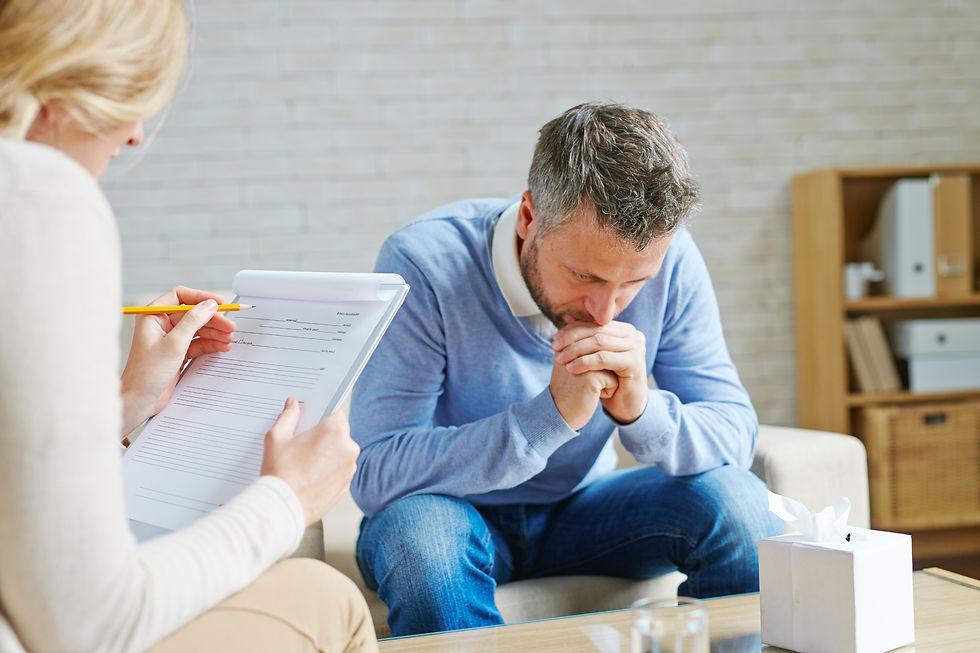
FIRST STEP MEN'S THERAPY
Anxiety Therapy for Men in Toronto, Ottawa and Virtually Across Canada
Supporting men and their partners
Services Available across Canada
Online & In-Person Sessions, Guaranteed No Waitlist
Accepted by most major insurance providers
Suivis/services thérapeutiques offerts en français
Does this sound like you...
✓ Are you struggling with persistent worry, fear, or panic attacks?
✓ Do you find yourself avoiding certain situations or activities due to anxiety?
✓ Are you tired of feeling overwhelmed and limited by your anxiety?
✓ Is it possible to overcome anxiety and regain control of your life?
YOU ARE NOT ALONE! And we can help.

Do You Want to Break Free from Anxiety?
If you answered yes to any of the questions above, anxiety therapy for men may be the solution you need. Anxiety can be a debilitating condition that affects your quality of life, relationships, and ability to function. But you don't have to suffer alone. Anxiety therapy can help you identify and manage the underlying causes of your anxiety, so you can regain control and live a more fulfilling life. While anxiety may be a part of life, for some men it can lead to impaired functioning, difficulty focusing, and trouble being present.
Anxiety Affects Many Men in Canada
Anxiety disorders are the most common mental health condition in Canada, affecting 12% of the population.
Anxiety can manifest in different ways, such as generalized anxiety disorder, social anxiety, panic disorder, and phobias.
While anxiety is a common condition, it can be challenging to manage on your own, and seeking help can be a sign of strength.

Can Therapy for Anxiety Help Me?
Anxiety therapy treatment can help you develop effective coping strategies to manage your anxiety symptoms. By working with a trained therapist, you can learn how to challenge negative thoughts, regulate your emotions, and face your fears in a safe and supportive environment.
Over time, you can develop the skills and confidence to manage anxiety and live a more fulfilling life. A knowledgeable therapist will help you to examine triggers that lead to anxiety, the role of avoidance in prolonging anxiety, and developing healthier tools to better treat and manage anxiety moving forward.
What do the Symptoms of Anxiety Typically Look Like?
Anxiety can manifest in different ways, and the symptoms can vary from person to person.
Some common symptoms of anxiety include:
-
Persistent worry or fear
-
Restlessness or irritability
-
Difficulty concentrating or sleeping
-
Muscle tension or physical symptoms such as stomachaches, headaches, or fatigue
-
Panic attacks, including rapid heart rate, sweating, trembling, and a feeling of impending doom
-
Avoidance of certain situations or activities that trigger anxiety

What Types of Anxiety Therapy Treatments are Available?
There are many different types of anxiety therapy, and what works for one person may not work for another. Your therapist will work with you to determine the best approach for your individual needs. Some common types of anxiety therapy include:
Cognitive Behavioral Therapy
CBT helps you identify and change negative thought patterns and behaviors. By recognizing and challenging negative beliefs, you can learn to cope with your symptoms in a healthier way.
Exposure Therapy
Exposure therapy involves gradually exposing yourself to situations or activities that trigger your anxiety, in a safe and supportive environment. By facing your fears, you can learn that you are capable of managing your anxiety and that the feared outcome is unlikely to occur.
Mindfulness-Based Therapy
Mindfulness-based therapy can help you develop a greater awareness of your thoughts and emotions. By learning to be present in the moment, you can reduce the intensity of your symptoms and develop greater resilience.
Comfort, Safety, and Knowledge are Key in Finding an Anxiety Therapist
Ontario-based therapists that are comfortable and experienced working with anxiety
When choosing an anxiety therapist, it's important to find someone who is trained and experienced in working with anxiety. Look for a therapist who has specialized training in anxiety therapy and who is familiar with evidence-based treatments for anxiety. It's also important to find someone who you feel comfortable with and who you can trust. You may want to schedule an initial consultation with a potential therapist to get a sense of their approach and see if it feels like a good fit.
)%20(28).png)
What to Do When Experiencing Anxiety
Anxiety attacks can be very distressing and overwhelming, but there are some techniques that can help to reduce the intensity and duration of the attack. Here are some tips that may help:
Deep breathing: Taking slow, deep breaths can help to calm the body and reduce feelings of anxiety. Try to breathe in for 4 seconds, hold for 7 seconds, and then breathe out for 8 seconds.
Grounding techniques: Focus on your surroundings and try to describe what you see, hear, smell, and touch. This can help to bring you back to the present moment and reduce feelings of dissociation.
Progressive muscle relaxation: Tense and then relax each muscle group in your body, starting from your toes and working your way up to your head. This can help to release physical tension and reduce feelings of anxiety.
Mindfulness: Pay attention to your thoughts and feelings without judgment. Try to observe them as if you are an outsider looking in. This can help you to feel more in control and reduce the intensity of the anxiety.
Talking to someone: Reach out to a friend, family member, or mental health professional who can provide support and help you to work through the anxiety attack.
Remember that everyone's experience with anxiety is different, and what works for one person may not work for another. If you find that you're struggling to manage your anxiety attacks, it's important to seek professional help from a mental health provider.
What to Expect in Your First Anxiety Therapy Session
In the first therapy session, the therapist will meet the individual where they are in their struggle with anxiety. The therapist will seek to understand how anxiety is impacting the individual's life and explore their goals for therapy. Given that anxiety affects people in different ways, the therapist will customize their approach to meet the individual's unique needs and objectives.
After establishing the desired changes, the therapist will work collaboratively with the individual to develop a plan for achieving those goals. Throughout therapy, the therapist will incorporate various evidence-based techniques and strategies to help manage anxiety symptoms and challenge negative thought patterns that may be contributing to the individual feeling trapped.

What to Expect in Additional/Follow-Up Sessions
In following anxiety therapy sessions with us, clients can expect a supportive and non-judgmental space to explore their thoughts and emotions. In the initial session, the therapist will work with the client to understand the nature of their anxiety, including triggers, symptoms, and how it impacts their daily life.
The therapist will tailor their approach to meet the client's unique needs and goals, drawing on evidence-based techniques such as cognitive-behavioral therapy, mindfulness, and relaxation training. Through these techniques, clients can learn to identify negative thought patterns that contribute to their anxiety and develop strategies to manage and reduce symptoms.
The therapist will collaborate with the client to establish achievable goals for therapy and create a plan to work towards those goals. Sessions may involve practicing specific techniques, discussing progress, and exploring challenges that arise.
As therapy progresses, clients can expect to develop a greater understanding of their anxiety and build the skills and confidence needed to manage it effectively. By working with us, clients can take the first step towards feeling more in control of their lives and experiencing greater emotional well-being.
What if my Anxiety gets Worse?
Some individuals may be hesitant to seek help for anxiety due to a traumatic past event or loss that they find too overwhelming to confront. For others, anxiety may be rooted in genetics. Additionally, anxiety frequently co-occurs with depression, leading to racing thoughts and feelings of helplessness that can make it challenging to identify and address the issue.
Untreated anxiety can lead to significant health problems, underscoring the importance of seeking help as soon as possible. By working with an experienced therapist who specializes in anxiety, individuals can receive the guidance and support they need to feel more positive about their lives.
.png)
Help is Available for Men with Anxiety!
We’re accepting clients online across Canada and in-person in Ottawa and Toronto
Don't let anxiety hold you back any longer - take the first step towards healing and reclaiming your life.
If you're struggling with anxiety in Toronto, Ottawa, or across Ontario, First Step Men's Therapy is here to help. Our team of experienced therapists specializes in treating anxiety disorders and can provide you with the support and guidance you need to overcome your symptoms. We understand that anxiety can be overwhelming and debilitating, but with our help, you can learn to manage your anxiety and improve your quality of life. Contact us today to schedule a free 20-minute consultation and take the first step towards a happier, healthier you.
Still Have Questions About Anxiety Therapy?
We Have Answers ↓
Interested In Booking An Appointment?
Complete the form below and someone on our team will get back to you.
Take a Look at our Anxiety Related Blog Posts...

Struggling with More than Anxiety?
Our team of specialized therapists based in Ontario are also experts in:
Click for more information! ↓
Non-Insured Health Benefits (NIHB)
Veteran Affairs Canada Coverage









